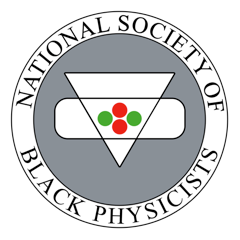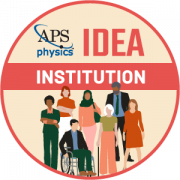Summer 2022 DEI Fellowships
Aaron Fisher, Mario Jauregui, and Rosie Torrez were awarded summer fellowships this year. The DEI Committee created the summer research fellowship to support high school and undergraduate students from underrepresented and minoritized groups in Physics.
APS IDEA
Alison Verbeck and Sarah Akin attended the February 25, 2022 APS IDEA workshop. The goals of the workshop were to reenergize the teams and decrease the sense of isolation, highlight examples of second order change through activism, and reinforce basic ideas of second order change. In addition, they created a driver diagram to help set a path for future work.
Outstanding Achievements in Physics
On October 29, 2021, the DEI committee teamed up with the Women in Physics committee for a ceremony honoring several faculty members and students who won awards recently. Professors Sachiko Amari (Urey Award), Erik Henriksen (NSF CAREER award), Nan Liu (Nier Prize) and Maria Piarulli (DOE Early Career Award) and students Jackson Butler (Barry Goldwater Scholarship), Garrett King (DOE NNSA Stewardship), and Lindsey Lisalda (AWF Student Award) were honored.
Congratulations Graduates!
DEI Committee members Asa Kalish and Viktoria Ohstrom graduated with bachelor's degrees in physics and Valeria Villegas graduated with her master's degree in physics. Congratulations to all three and best wishes on your future endeavors!

Congratulations on the AWF award, Lindsey!
Our very own Lindsey Lisalda, member of the DEI Committee, was awarded a 2021 Student Award from the Association of Women Faculty. The award recognizes academic excellence and leadership potential among women students whose research, teaching, or service benefits women and gender minorities.
The award will be presented at the AWF's Virtual Spring Reception and Awards Ceremony on April 29, 2021 at 4:00pm.
Go, Lindsey!
 Well Attended Neurodiversity in the Workplace Webinar
Well Attended Neurodiversity in the Workplace Webinar
On April 6, 2021, the Academy for Diversity, Equity, and Inclusion, and the DEI committees in the Departments of Biology, Chemistry, Earth & Planetary Sciences, Mathematics & Statistics, and Physics hosted a very successful webinar on Neurodiversity in the Workplace. Eighty eight faculty, staff and students attended, sixteen of whom were members of the Department of Physics.
Discussion topics included: Defining neurodiversity and neurodivergence, How to be an ally on campus and beyond, Benefits of a neurodiverse workforce, How to be an inclusive employer, and Working on a neurodiverse team.
If you missed the webinar, you may view the slides and video presentation. (Only for WashU accounts)
New DEI Fellowship is Funding Three Students for Summer Research
Byung Ha will be working in Kater Murch’s group to experimentally test the second law of thermodynamics in the dynamics of a non-Hermitian quantum system. The second law of thermodynamics, stated in the form of Jarzynski’s equality, relates work applied to a system to changes in free energy. This equality has been shown to hold even in quantum evolution, where work is characterized in terms of transition probabilities between energy states of a system. Ha will test whether this equality still holds in non-Hermitian evolution, where energies are complex and probability conservation is not guaranteed. Ultimately, Ha hopes to characterize the information content associated with any observed deviations from the equality, helping extend the field of quantum thermodynamics beyond fundamental assumed symmetries of quantum mechanics.
One of the great challenges in biophysics is accurately measuring physical properties, such as temperature, at subcellular resolution. Gianna Glenn (Class of 2023) will spend the summer in Shankar Mukherji's lab to establish experimental methods to carry out subcellular temperature measurements using nitrogen vacancy (NV) centers in nanodiamonds as a tiny thermometer. Gianna will first establish protocols to coax cells to transport nanodiamonds supplied in their environment into the cellular interior. Upon successful completion of this crucial step, Gianna will work in collaboration with her Crow Hall neighbors in the group of Erik Henriksen to leverage the exquisite temperature and spatial sensitivity of NV centers in nanodiamonds to map temperatures in the vicinity of the various compartments that make up individual cells.
William Ho will work with Manel Errando on the optimization and calibration of high-purity germanium detectors for future nuclear astrophysics missions. When operated at low temperatures, below -170 C, germanium crystals can detect gamma-ray photons with energy resolution of just a few keV. This response enables the study of nuclear lines of astrophysical origin such as 26-Al and 60-Fe produced in massive stars, and the 511 keV line resulting from annihilation of positrons whose origin still remains controversial.
Congratulations to all three students! More information on the DEI Fellowship.
New DEI Fellowship is Funding Three Students for Summer Research
Byung Ha will be working in Kater Murch’s group to experimentally test the second law of thermodynamics in the dynamics of a non-Hermitian quantum system. The second law of thermodynamics, stated in the form of Jarzynski’s equality, relates work applied to a system to changes in free energy. This equality has been shown to hold even in quantum evolution, where work is characterized in terms of transition probabilities between energy states of a system. Ha will test whether this equality still holds in non-Hermitian evolution, where energies are complex and probability conservation is not guaranteed. Ultimately, Ha hopes to characterize the information content associated with any observed deviations from the equality, helping extend the field of quantum thermodynamics beyond fundamental assumed symmetries of quantum mechanics.
One of the great challenges in biophysics is accurately measuring physical properties, such as temperature, at subcellular resolution. Gianna Glenn (Class of 2023) will spend the summer in Shankar Mukherji's lab to establish experimental methods to carry out subcellular temperature measurements using nitrogen vacancy (NV) centers in nanodiamonds as a tiny thermometer. Gianna will first establish protocols to coax cells to transport nanodiamonds supplied in their environment into the cellular interior. Upon successful completion of this crucial step, Gianna will work in collaboration with her Crow Hall neighbors in the group of Erik Henriksen to leverage the exquisite temperature and spatial sensitivity of NV centers in nanodiamonds to map temperatures in the vicinity of the various compartments that make up individual cells.
William Ho will work with Manel Errando on the optimization and calibration of high-purity germanium detectors for future nuclear astrophysics missions. When operated at low temperatures, below -170 C, germanium crystals can detect gamma-ray photons with energy resolution of just a few keV. This response enables the study of nuclear lines of astrophysical origin such as 26-Al and 60-Fe produced in massive stars, and the 511 keV line resulting from annihilation of positrons whose origin still remains controversial.
Congratulations to all three students! More information on the DEI Fellowship.
WashU Physicists attended the NSBP Conference
On November 5-8, 2020, Chipo Raranje, a senior undergraduate student majoring in Physics, and DEI members Valeria Villegas and Saori Pastore were sponsored by the McDonnell Center for the Space Sciences and the Department of Physics to attend the National Society of Black Physicists Conference. Chipo expressed her enthusiasm for being able to participate in this event and said, "The National Society of Black Physicists conference was a unique and eye-opening experience for me. As a black woman in physics, I often do not see many people who look like me in the discipline. Being able to learn about the different innovative research being done in labs across America by physicists of color really reminded me that people who look like me also belong in physics." Valeria also appreciated the opportunity and said, "It was my first time attending the NSBP this year, and I hope to never miss it again! Even though I do not identify as Black, I nonetheless felt an overwhelming sense of community while participating in several breakout sessions on navigating life as a minority physicist. It was also encouraging to see all of the institutions genuinely invested in diversifying the field, especially as a PhD applicant. I think everyone truly committed in promoting diversity in physics should attend!" The NBSP is a very interesting scientific conference and we really hope that more students will participate in the coming years. If you are interested in attending next year, please contact one of the members of the DEI Committee.
Congratulations Barry Henaku on the USTAR fellowship!

Barry Henaku was supported for 10 weeks of summer research under Washington University’s USTAR program, aimed at helping rising sophomores break into their first research experiences. Under the direction of Prof. Henriksen, he studied the technique of using defects in diamonds as “quantum sensors”, whereby one uses a green laser to illuminate these nanometer-scale defects and observe the intensity of the re-emitted red light. The intensity will vary depending on the strength of external magnetic fields and so can be used as a sensor. Henaku read a number of original papers, and assembled a parts list for a basic experimental setup. This enabled him to build such an “optically-detected magnetic resonance” (ODMR) capability at home, with which he can learn how to carry out this measurement with the goal of ultimately helping to build a new experimental capability in the Henriksen lab on his return to campus.

and colleague, Aline Arra
A message from our former DEI member and awesome scholar, Katie Randolph - We will miss you, too!
I came to the physics department for a master’s fellowship as a JPP scholar with the ultimate research goal of using biophysics to advance sustainable energy technologies. While here, I worked on research in cellular biophysics with Shankar Mukherji. I also acted as a graduate student peer mentor, a mentor to undergraduates through the Women in Physics program, as well as a committee member for DEI, outreach, & GradSem. Upon completion of my Master of Physics, I was offered a position as a PhD student in Buz Barstow’s lab at Cornell’s Department of Biological and Environmental Engineering. This lab focuses on sustainable energy development through a myriad of systems! As part of my offer, I received the Sloan Fellowship, a prestigious award from Cornell Engineering that affords me a competitive base stipend as well as 10k in professional development funds. I am excited to move on to the next phase of my career, but I could not have done it without the wonderful support & intellectual development I gained from this department! I will miss you all!
International Scholars
The Diversity, Equity and Inclusion Committee in the department of Physics delivered a letter to WashU administrators on Monday, July 6th, 2020, in support of the international community in the wake of recent immigration restrictions.
We asked WashU to take a stand with its international community members, to add to the voices of many other institutions and organizations that already have done so; to provide up-to-date, comprehensive, accessible, and consistent information across its web pages and regular communications from the OISS and to provide WashU visa holders appropriate tools to navigate the immigration system.


